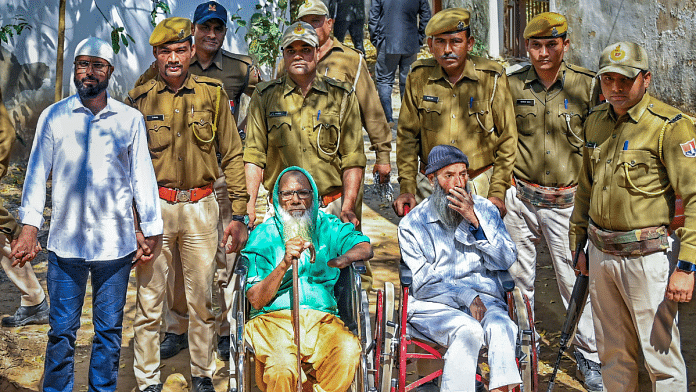New Delhi: Absence of ‘direct evidence’ corroborating supply of explosives, no mention of his role by any of the co-accused, and ‘lack of evidence’ proving his presence at the Lucknow meeting where the conspiracy was hatched — these were the specific grounds for which a TADA court acquitted Syed Abdul Karim ‘Tunda’ in the 1993 serial blasts case.
On Thursday, the court absolved Tunda from all charges related to the case as they could not be proven “beyond reasonable doubt”. It, however, sentenced two other accused, Irfan Ahmed and Hamir-ul-Uddin alias Hamiduddin, for life.
A series of low-intensity blasts in five express trains on the first anniversary of the 1992 Babri mosque demolition had claimed two lives and injured 22 others. The Government Railway Police (GRP) had registered five First Information Reports (FIRs) at Kota, Valsad, Kanpur, Allahabad and Malka Giri.
Prior to the two life-terms pronounced by the court in Ajmer, 15 of the total 18 accused produced by the Central Bureau of Investigation (CBI) were handed the same punishment way back on 28 February 2004.
Advocate Farruqh Rasheed, who represented Hamiuddin in the Supreme Court, told ThePrint that the latest sentencing was pronounced purely on the basis of confessions and that the order will be challenged before the apex court within a month.
Also Read: ‘Bomb expert’ accused in 33 terror cases — who’s Abdul Karim Tunda, acquitted in 1993 blasts case
Long delay in Supreme Court
When the CBI was handed over the five cases registered by the GRP in 1994, it clubbed all the five cases in April 1994 due to the origins of the blasts being one conspiracy.
The CBI filed its first charge sheet on 25 August 1994, and a decade later, the TADA court sentenced 15 convicts to life imprisonment.
Advocate Abdul Rashid, who represented Irfan and Hamiduddin in the TADA court, told ThePrint that the accused who were sentenced in 2004 filed a criminal appeal in the Supreme Court, leading to transfer of all case documents.
Although the Supreme Court on May 2016 upheld sentencing of 10 accused and acquitted four, the original documents returned to the TADA court only by 2018-19, the advocate told ThePrint. One of the accused turned out to be a minor.
The case kept lingering in the top court for 12 long years with frequent adjournment and shifting dates of hearing. The case kept lingering in the SC for 12 years with frequent adjournments. The criminal appeal filed in 2004 was finally disposed off after over 100 hearings that began 27 January, 2005 and ended 11 May, 2016.
Irfan was charge-sheeted by the CBI before the first verdict in 2004 but he jumped parole and was later arrested in 2015. On the other hand, Hamiduddin was arrested in 2010 by the Special Task Force (STF) of the Uttar Pradesh Police and was charge-sheeted the same year.
However, advocate Rashid told ThePrint as case documents were not with the trial court and that the CBI had not appointed any public prosecutor to start the trial, they moved the Supreme Court to seek bail in 2019.
In August 2021, a bench headed by Chief Justice D.Y. Chandrachud had sought case status from the TADA court and subsequently ordered framing of charges against the three remaining accused — Tunda, Irfan and Hamiduddin within two weeks. The next month, it said that the charges should be framed within 3 months.
The next month, the TADA court was directed to frame charges against Hamiduddin within three months while noting that delay in trial was due to three reasons — pending application of accused, lack of appointment of the public prosecutor, and non-availability of original records of the case.
Meanwhile, as per the latest court order, the CBI did not file any specific charge sheet against Tunda despite taking him in custody in 2014.
Sentencing & acquittal
On Thursday, the judge said in his order that both Irfan and Hamiduddin have confessed to having been present at the residence of another accused, M. Jawal Alwi, where a conspiracy in Lucknow was hatched at a meeting during the last week of September, 1993.
Dr. Jalees Ansari, accused no. 1, conspired to carry out explosions in long distance trains to terrorise the Indian government and create enmity between Hindus and Muslims, the TADA court said.
Both Irfan and Hamiduddin did not only agree with the plan of carrying out explosions but they also played an “active role” in executing the conspiracy, it said.
The court said that Alwi took responsibility for the explosions at Kanpur railway station for which the trio — Alwi, Hamiduddin and Irfan — traveled from Lucknow and that the CBI has been able to produce a witness to corroborate their presence in the city.
While the judge concluded that charges against Irfan and Hamiduddin have been proven “beyond reasonable doubt”, there was not “enough evidence” linking Tunda to the charge of criminal conspiracy behind the serial blasts.
“The investigation has not been able to make it clear the role Syed Abdul Karim played in bomb blasts executed in various trains on intervening night of 5-6 December 1993,” the order reads.
“The investigation has produced evidence that explosives that Syed Abdul Karim handed over to accused Dr Jalees Ansari were used in some criminal activities linked to Mumbai serial bombings, but it has not been able to make it clear that either Karim made explosives available for the other accused or was involved in conspiracy behind it. Hence, charges against Abdul Karim have not been proved beyond reasonable doubt and he deserved to be acquitted of all charges,” it further says.
(Edited by Tony Rai)
Also Read: The forgotten story of how jihad plans failed in Ayodhya



